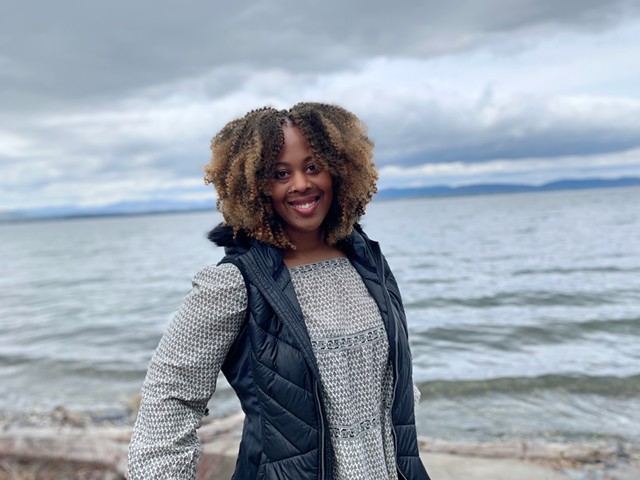click to enlarge 
- Courtesy of Yasamin Gordon
- Yasamin Gordon
Arriving in Montpelier as a 10 year old in 1992, Yasamin Gordon quickly learned what it was like to be part of a minority culture. She loved living in the capital city, but she also remembers difficult conversations with her parents about comments kids had made at school.
Overall, “Montpelier was very welcoming” to the family, which had moved from Florida, Gordon said. Though she remembers only one other Black family in town, at most, "I loved growing up there."
Gordon went on to a career in education and as an advocate for equity and inclusion. On May 10, she starts a new position as the first equity director in Winooski, the most racially diverse municipality in Vermont.
Gordon’s position was created by a three-year, $300,000 working communities
grant program run by the Federal Reserve Bank of Boston. She'll oversee aspects of the grant: creating an equity commission to ensure community members are heard during decision-making processes; and strengthening partnerships between schools, businesses and community organizations.
“The whole point is to figure out how to bring marginalized people to the table, how to include them more in the process of policymaking,” said Gordon, who most recently worked as lead diversity, equity and inclusion coach for the Champlain Valley School District. She also was planning room director for the Shelburne Community School. She lives in Shelburne.
Gordon said working face-to-face with people in the community — not through social media — is most effective.
“COVID-19 has kind of exacerbated the lack of engagement for a lot of people who haven’t been able to access supports,” Gordon said.
Winooski, a city of just one square mile, is home to resettled refugees from dozens of different places and cultures, making it the most culturally diverse city in northern New England. More than half of the pupils in the 870-student school district are from minority groups, making it Vermont's only "majority-minority" school district. And almost a third of the city’s residents live below the poverty threshold, according to Census data cited by the Boston Fed.
Many residents “face very real language, cultural, and trust barriers to participating in community dialogue,” the bank said
in its description of Winooski's award. “Without intervention, more than one-fifth of the low-income community will have no voice in the decision-making processes that directly impact them.”
The past year has seen a youth-led anti-racism movement for change in city schools. The push included a demand that Winooski remove its police officer from campus. A final decision on that is expected in the fall; an officer will be on-site for the coming school year.
Gordon spent four years living in Ireland, where she worked with a refugee resettlement group that was assisting unaccompanied minors. She said many of the obstacles that Winooski residents face are universal to minorities everywhere.
“It’s glaringly obvious the gaps that exist in the system,” she said. “You can see that people who have privilege are getting more access to resources they need.”
She added that she doesn’t see her role as one of helping newcomers become more like the majority group that is running public organizations.
“It’s not about them necessarily acquiescing to our culture; it’s about our culture being open to learning about them as well,” Gordon said of New Americans. “We want to help these people integrate to our society. But what’s going to make them feel like they belong is not us telling them to change everything right away.”
The Boston Fed’s grant program is paying for the first three years of Gordon's position, but the job is expected to continue beyond that period, said Phoebe Townsend, Winooski’s human resources manager.
Vermont towns, colleges and school districts are slowly starting to form commissions on racial equity, and, in some cases, to hire equity and diversity directors.
The State of Vermont hired Xusana Davis in 2019 as its first executive director of racial equity to work with state government agencies and departments. And in February of 2020, Burlington hired Tyeastia Green as its first director of racial equity, inclusion and belonging.

























































